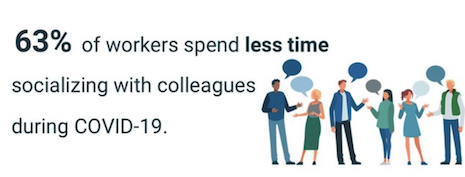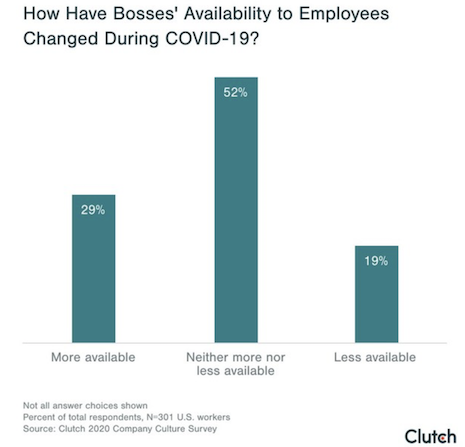Not only has COVID-19 hurt the health of consumers worldwide, it is also impacting the tenor of work culture as employees have been forced to work from home for months on end.
Gone are the days of Friday happy hours, team-building exercises, corporate retreats and inspiration group outings to museums. These events have a positive impact on teams at luxury brands that rely on collaboration and creativity to design collections, create marketing programs and inspire sales associates.
“A large part of socialization is casual interactions,” said Matt Miller, editorial associate at business-to-business ratings and reviews firm Clutch, Washington.
“Now that there is no bumping into people in the halls or chatting by the water cooler, all interactions have to be scheduled,” he said. “There is less casual socialization and less socialization across teams, especially with many companies not adopting virtual socialization.”
 People are spending less time socializing with co-workers as a result of lockdowns, per a new study from Clutch. Image courtesy of Clutch
People are spending less time socializing with co-workers as a result of lockdowns, per a new study from Clutch. Image courtesy of Clutch
Virtual happy hours
Employees are already voicing their concerns that COVID-19 measures are damaging their corporate culture — environments that had been carefully curated for boosting productivity and creativity.
Sixty-three percent of employees said they spend less time socializing with their colleagues, both in-person and virtually, ever since the COVID-19 pandemic hit the United States, according to data from Clutch.
Even as consumers gather for Zoom coffee meetings and Instagram live streams, socializing among co-workers is suffering due to lockdown. HR experts have said that even as the work continues to get done, remote work is putting a damper on office socialization, even as companies try to adjust.
It is not for a lack of trying. The report revealed that 26 percent of companies have provided employees with more tools to communicate virtually in the past 30 days.
That number is expected to grow as companies are investing more in digital communications tools to ensure that employees have greater access to the technology they need to connect. However, even with the adoption of Zoom and other such video conferencing apps, socialization is still suffering.
“The best morale-building workplace virtual socializations are unique,” Mr. Miller said. “A happy hour over Zoom will never live up to a happy hour at a neighborhood bar, and a meal over Google Meet isn't the same as a meal at a restaurant.”
Still social games or interactions, even over the Internet, can be used to help teams connect during the lockdown. And yet only 13 percent of employees report that their office has hosted a virtual happy hour and 9 percent say their office is hosting activities and games. A mere 5 percent are dining together online.
“Morale is incredibly important to productivity, and socializing is fundamentally linked to morale,” Mr. Miller said. “Bonds built over socialization improve workflows, too. Knowing somebody from the office in a social context makes it easier to ask or give advice, especially if they're someone that you don't directly work with.”
Even though HR experts think that virtual social events are a good idea to help people adapt to remote work, 35 percent of employees report that their company has not hosted a virtual social event since lockdown began.
The most popular virtual social event is professional development sessions, which has the option to be both fun and career boosting. However, only 19 percent of employees have experienced virtual professional development sessions during lockdown.
“The best activities are ones that use the distancing to its advantage — Fitbit challenges, virtual games and Zoom Jeopardy are all unique ideas that take advantage of the current moment,” Mr. Miller said.

Boss availability
On the upside, 81 percent of employees said their manager is as available or more available since the start of remote work, according to the report.
Only 19 percent of employees said their manager is less available since they started working from home, suggesting that managers are adapting well to remote work. Ensuring that employees have access to their manager while working from home is essential to maintaining company culture.
For luxury brands, which are designing and selling a culture, this is essential.
“Luxury brands represent a lifestyle, and it's tough to promote that lifestyle when the team behind the brand's morale is suffering,” Mr. Miller said.
“Unique events that leverage the current moment are the key to building team bonds, even when we're social distancing,” he said.
{"ct":"osvIlmtoRhXfyW1xT7AkBfYbxFizIjsm2mkjM8AL+Nu8cEgC5tlqevjwwhM6pJj7mRYzJkvm2sENM7pRgmqnmKE3BqUxG8Q8HMjfHzy7UX3lWUkOU6fiQSxgsaxsZbFBryu7W4EHEUIcj0pG9RyAEa+YSNaBQhBR8Ws3PBf3KdvxBLJTKhbFYGGqtTP3GdP0c\/1sa1K0nuZL\/DfJHRZxwd\/TllZWtkzPRGdb9zKu4sV1MCdLEtjA5mjt8ad4KCQI+B5viL\/qk4ZYVku3JdoRTXYWT4fwNwvdLp0cLoAT78xPR7AWPfFxoEu4W79\/hL52Va6ZeUgYrA8l0D665UDaIaxhDbvzMih6wUEqh4MuEeIqL0Rb1zOJb3rGvKLcDalzEFd5TO81NlpfbMKDwdDWHEjNRIGDDxrcc1NFAqOtUbNlK0L5vDSTbDNuxuglQd2Ls70ttrAt7VcZ79UeDnwwuEynNCn7zh8CFrTnPxAG7jqbGfj4A95B8CRKamLCFRTRw97gbHMHB6YP4ijL3jJKACcMTH5yfDrfeV6f7M1aDbpBY1Wup+MMGTNFvUflm0gVarTPPCTtXc4yjblnbw9iPGwp3rTLxmxyYUDyi3zDxUnH1c7mMMMtcfalkO4\/nLka9D8OPcOF0k3c+7jrqtr2DU0+7AE9FRlGcvjLS46fYnPyy\/tKzbjtwK0Wi3VOAy8E+WUpF3X1oNjK50FfWzmmnFMlx9pvStcEhVGrcdHoITKRyAS0pBO0F3JXy1cRTq6QDiR14QvKUQJqc7QU\/jXATvH+zxsyDQuQPPUOINEP9JASCUmclyjnxflvMgpDQRGcNGsU8ug5jl86JjAX254rXN5wAJBvTzlfkxu2dkHlDHSHjcmAYTEeKNI+6y3bPWNSN+4332G+ULimkJb19xuZYswHui3cG2Fc1eRCVm\/IET94vKUPsAPNXC+zrmZrIagRnTiHqEhxXNYPuHdLeYCjS43Xf7xVk2YLmB66jjsNWeyW1DoDRI\/f7c\/yUGts0bz828rR42vO5LKO867TR8gxM4hteJlN1LDqrD92Nqz06Flyjm2Lczka18ZL\/Daosb4PXfJ4AdFfpQs5Z2f6iZAlWeOqTohKzElt8CcuhqiOh8sYbgdYJwaRdI6jy\/r69QhJEhY88KevioKcxwuXqaDmZe34XgvQ+F12qrbozdy++tV\/grVP9WiU2QKY+YDQXe94XqglVyqfhtEhH4JlfF2Xngm7Xbgce8M576qbV9AHQaZ691AMkqVlGHTvea1icMIVH6L\/3oTxfjgXN13RRryxu+3f7zYEnB3R99DmsOMXEI6Dag3JTcaQ324eUig8fGzSEkvHcE5XVzfZeMI0iLm\/g3uHq4KBxJH3XOZhPJjdYG7NrWVYXi8\/xjwXKT0++U7TkOewbpHv0qV\/OClzyHyoEepFohC81bFi82LHtFVlcE8vFxK9lbqX\/Q3kDjuLGeRAzjMR1Y0KKQ3qz74n032kRyAL+LXiegtxG2wzMgkNC4vWsOgcop5\/5ixT02+RbU10ZK52t4J9ZaKSSoKBjCOV4zuH6OAGCqaONZtc\/Hj7m4clPaKbwGAKw1kmaYMRUDDLM6dwqrScbgHMK1cAP7KUxRE2Yd\/sE1fZ3HJuqFbWqucHMN3tjr4w\/4drL+FGuS1s9ADKA8zB1Su9uliFKh6sg\/lGTITnQu4eeaQ8YXIddHtkpsb3bbZ7dzKUpIcZNpdKlH3+1xSoxdZaZTrgMZNcYk8IKBJY+SgEI5QolTLhLvOXZr+MzzAWk+qgxurdYyRXzITKjYS50HGrepq3j9WOFv6bNkF9wkKRt4faD14lN\/XeE4H6Ue7d3qwnFoQPBhJXWyu9ELM4cSwNOlN\/0+ocsYRHynyLMBQ7IqK6nVup1B0ffPLLzxM1PDubdAnQMYTlIH\/RkhL4FdkOKDFOtsUlFoc3sDUSPDBchAbWjXLuWv4h7yhB8ddqDvTroyH5+wy4NFkUvYRcVC4bBA1o\/M\/rtGbLbZrE5XKmW6kiYgSVKGaITnxX2N9XQKkRIZqZ2Ql9+539qYdUvQGL3X9Xoro\/Skv4P46OxGUW3ihcj43t62ymkjUh46ZtXitCtvE20mjYCN8LFcFmOTUvb8Ej4eN9Lwo1BM6JOd90xbi6C4I+l\/fR1B2ukSilGSWjmw+qoLtn\/IOyDx8ES3s2191YRu3ebNO+OMe+E7SGsHb1lQ\/FObqyL9JVB00C+Tfo0lQM49BADn4Ur86\/o0NjnT1qoixaRY7pnbUUuMpg+qOuoH67NsZSm\/b1otR\/nnYc7M9ERFRrd9gv7n34biDRRfw++Nly9H1cgagcKBwTHgcytWniO0pgW28QcCeaXu4\/rQc1GN8Ho2UdB+rVsT0NqEjKqaNyxhTqxrTgA6jcMyr\/\/36tyjYFaUBAi+IxRllpvHzINrQL87TGLgZr+oiUhQN02hNQwOA3K2UqGuX5qe4vvQgINLd5KNz+pg8q0oXzeenozkpbXJuzBV3DT4aj7nZW5\/\/rc1lRE0UPWXm\/xrYbil7N9GBQWm5rn4GGbPYbVSqwtZegm19SCYDdhZ7KUKSW\/8L0iThN+FJfKVUB1U6ZROFRJ07oCLzAPtKGZztf3XplOcBf4YFH3ybHUjdyJ9O+6oqzR+PWLT7DEcrcryXUvKTMQN6qG+qIZV4WKOrg5XHw4G3kbvUG6MsxpuYDydj22kyIH8G8HFAlr0iHpH+Xkpc6EKiwj4\/V2e2Av+EO6vkgCsWLwKlMc08\/p7L21n+hG7hxf0uuULlJQ1TWZxN\/7+aVLz2SR7Kngyp7eNEsqE6pGzLQjSBlzRgWup0Lxn\/UP5VtC4Rqm90HYmvCDBESLxru6NbDd2XvuHzadAiSjZKx5t1JrtYlWBbXxU8um\/PeeJegd6rtsPakVICYeYaQl19+7L+Y0BAU80PMo5UD1hE7ejSupZ2AMXuJlv0UguGF4rtGGwbmXgqtXOwyGMWrcHGbBWpAqv8qZpWS9aqODVeUNfVgBwYL0NcqdxuMBNiwKnt51nhgE\/W7n8QjFQPheDqKl6t4V2JTFu11Wg1c5+SehiTIEtc7pdw5VTU8mwdHOWoxa+um6a8bDVSDbm6gsksxxrkSpIVd+ooZNPwsBmOWIDnUml+XFhEYjPpZdNfHMmy8b0f0tKc3jVLzs4IRXkeCZQ9J6MJ9Yt4XVcW\/gKS2Co16O36bSy1Xt7GMLoDcySROxuMfdOVlwlptl7Eza3Ksuq2VgD\/P2APg6jZGuJ3BiULoH4sz9edsQr\/RVxBNwi0Cz6XNItSy+lq\/NsQhPPfp1T0LKPZiif4o+5QHUveSVffmEPXSUkgTK6RIf3elL8iBFbRVQsZWp9zWuPzNqlf\/KSJFRHxQGQMHSRmP8ApBoM9FN8dXRnhhR1kjUAqzWHywDnyeo0sL\/Li9mlGvNS5i3a1aQZHyiltC3Wp0UggGJMx0L0F8c93Awq0wbR+C\/eBMVoUrKSQnFBXZxln8iclgQfc16HqnYXTOgQjI894Scov4RsvOZaHUdgPGtlIOBg0wPIOpE92eAQZfcMHqHzJmX5ywLoQXodGpBK6fd9KnSezw8avO7TrWU2a+s08GXpJ2iMpdKA3w3Fn6PHBW1092\/F51aSUPIv8GAR8D2R+YJnqO25d6yhUsPAz45vtcyXYGaQv6AX2uiKSi35fhGKah7zBIz0NHXbdBBbH+SDMnwkwqv0atcNvp2cMFpsa5igD4qNqlZjOMIfIP0efn1uEgqYfPkwbcKGDxrmLupljrCGY2t9XR5PvBmH1cjOm8CbqQzBzOrL6Kvaq6joGLAB9ZCdZNhw1eahePslLylctKgBBf1OYWx\/mATRrd5\/Rqo3RLUd9Iz2USFd5\/5lZ6YFrD5I11RmANw9cfPI2XwwuWiZFWjVBHONW4rXSZUjf0e5MHTGHPT\/PREUzMSh1zECTbduH0BuFrMTY7HC9aYjIvIg\/44MEDuWT2u0fGIsvs8xUhye1Q23ESCHli3K7yBxIUIwGwqZkUgzj0M6dBFydGfAI\/J7BF70A7Ap8Rj0q+mt+o\/N\/Kn6chJNLaamWlE79REftwaCImc9bVal3HMIv0pmQLUCo\/ALyGaFBsWUtQdae2Br7kJ04TvcSr\/X1DxqOSN7M7jYAJz7s0FmayW2P6xhWjpfLYS5qM3EEJRqKqt4dVZUkuhKYXVvn9JtJoKhQNTGhpknz5Hg+uZUHAUReojeiuaqbp+pp+3zvUFD02b3vEg5nZCP0+JdBSPVVY+6F+2oQGN+j0CXMXMeY3WbdoqzRYnPfhSJlkveoTQEe8T3\/9GXIXR12enSYsP6zo8MB49\/vDqPD\/br9tX8NyDZXkVif2hLtiKrVRLOTAM4uPujXgFac5Mggt6gwdV3DosczT1YWNtptP9tNkR15246JQxRImkqabHgNY+et6oJ70ZsPT8pdeDwRfsdJDg9J90r2+6bG5QrPkIRC7QA4pgxuHIi58RCDS\/IGjzW1sbnmvPndSHWykMzPWDV\/I+l4gNttnLZzJ7gcBe2paTKkFTYuVa4wsfkXyVuvigoeWINsmmxtfuqQQ2ODGkeKEoGWi35GAMx7dJqoNn87NquDenm2XG4i7IgSdshBjnHuCOrKVj9HJPlh5w2aTcubuDNtoJQbD7CPZNPuz7OFnurWcD6bXp4eNuYVMyrp4kwxi9VOjuc22NjcvxwGep\/Y8DAtAQOlfgz+Utt3\/AXkoGJVVKWskYXEqcVbsBIvBc5DVpTVITTMOSAAAdnJR4gn43dTX9tzugcSt7f+2MCPO0nvRKaBySRk7HNoL6ycap5NVROY\/mOfX341uojD7oHc2cZZDKqvECEW\/kS3FzWEF3dzo4nAb+C22ihu0xkamYUyQQ8HBPSsfVj6lNnFbTQLzp7DL7RSO2KgBg3GnNflmauZlYya+edXRnNE9y+OrbiUQUxqF3ldCrNY4CueLLSIs7Fm157QY4WFFa7s3ecmVOwLr2Fv8fQRKr6SdzPwFFYLOlyRHNHxo5\/ymBMXL4ahpT0r7Kn+TQ2XXTRO+GTzICrqiuqqWUmF\/XQ0UvhxojM4OeCmP0k1iBbXDv9vohjVRGh0gpFZKC2N9BLQSyqcsF4Zk3ICZQsc1e4nwfH2l3qHBXVqUJyJSwtY\/TdLDfnsng7w4GiDwiX1mLLp9lCIyx5+dFYo8gq1kkAoxbb78wcJo6GXru72HEIp7pyRP0255tSRTvDQ8af2GUcSH0aZRERh0NR2LCE9imMX0c8sqrjoTNePmUaejzjRKTdehctf2nIr5Rq9I6FYmOD2BJpEdZmLsQIdhWH\/vU1hnFA9PQIZuB1FwMvjtc5cWrUbKhnl+jNuH8yXl7fcsw3PIqQ5bQGF1QmG+zKDZ5JEYOmEBZ+rvr279mnd+\/roUPrr8EBgaI8vQHtgSQcNQk00wwi3uzYFsFhzLF+rZv+jqV0Ac9wl4rQ+CHf2d0eC00ubeFrNWQVQUlHQVI9aXh2gIDVzqfJLoN0LftcIG0l8I7uHHyVt9auxIZpEslkmrw77yoLO1qq6hkmy85Bo9kZTjICcxoSwWz4\/GAy3TChGtiI4WLOdoNUOCeSVcaBpba8MrfsFKyf0SfXUNoO262fDQ7dXDutsGg7kNdpejgggHgzD1mNCGgfGk1hwWMnu2qGOHK1bzIIQCCHYeZZQztjspBr\/ZS98oCcY8aWj5v4aXnrCk6mhVDzhXx71QjMWWuB\/cm\/ltuzZBjMsmlXPqCXTVpdNVx2H2uYsjoG3fpX9WZZ8ku4StdmRn9BiE4UFQhbBp4AXBXKK19QUe7c2a1Bn7tdHg80Z\/8LcX\/9\/zNGmNfLcNGIh6Peoj8IExjqcnZ0LnisZlss6L684wUEZANZ9Q1jQgWbNaR6XSHF1gLgqoRyyJo7WH8ZSn6+h6LWUju7Bp0g4w5yxgit6tjiLuWCXM9KbHawxBk9Z8JrI3mefpJ3xm5VslIMBOJeeqPjths7vp+NGsye+hRsux3RnkxIHZr7XYtn6YSSxKoifM0bJv3pFUmP2+RCQ0ylRq7kdHvzVDNr77RNnsIdYEpwRFE8uPBspOSbzRjs471Zg4SNpSNnXTrqbY4j3RWwss+hCljREL\/XUuIr9bQlwd3TxRI97cz0t4htidtWtqVHHs7BvgeUtY+OspF2B7kI5WLSZNp4kSYnKTfMaeX0Grm8sXmCUYg7desgN7jxnD0HiKUPz41W6jjRuW+IDM\/\/dYDeJExpmZNk3nOxnStlwGaDBKBFd3RV\/v2RyVegGwCRJ6ZMSBjcmbtcColJvUsOXqc9CkAJsTJF0Fff2p4BAPfu13GStvd614VyT2PTuyZ4859Egh10N9lW8BQE7z+3waa+nmWThTzB8uqx8zipmw6wta6jyQkWajLFOx0pBgXojsAL0\/EklM5Se620t08hbgD2\/2oZ5ufGivEgkBjLP4JAEdmcp7LxNQcpf54+ygHpZlgQfpBMj79+IST1KMgHPVjy4hEx\/qzk3ZMxvN\/6eCZrkMEGCTkUDtz8i0bSNcJUOtXi\/919ScHyjLtVvdiTqrLfQ3D4Qru5SDvr4\/p8GW3D3eBInpkDffCIr0gm5ilR93uRx4Q2R5D1QI+xhPtYu6IqPl3rannjGH2k+RK9Uv4cDD+T6042gHndMGpaSQtTgwQxMAG8ihmpBV8ctukVg5IgME9KL+4f7BWtf6+Qk12C9XwU2cRejTKkDcZt0r\/5QC6Mj\/bAtfP2GvUhuKxStnWjoHbQ7RsIyWvHLl4+L6mLV+NcA4ZqlrhNt6quZw5AD9s8+sH0E8IlMsFYjbsmdipSvCd9BQtkjevR9rtyoriTtb9fw3mLlbWx4p9bjhPJqSTsEnBpGWVGj\/0NC2TsgECZoVlTuc5KKonW1+Yx1axtC4cTZrl2ZaJVKiu5rZOaBeDiKXLovZ5r1eliGGwe\/N\/NbZPsmjnpnnrJRDZqqYzVJKPF7rVquvEPFMAnQbfS5HkAos\/yHwfD+6U6k8ss8LcNc2p\/k5Ab2GJAJGjruLpH+2eXBzAXpFGNOfkJlNX1d7ecD88F4VJO7rfzOwGKjkM7f83eDOUUS2ILhCSaPwiUbyylo7vnIL27va2NHlSYuYMzAzwSgnU25n83tHUQxlox1j4yykr4fSQS3UCTDiwytcnvxuPqZuhcBIvnZ6OXGtqZiBufDmgRR5NT7kRsLTN+HaGl9h8GW\/fbCz07yspzLz7xlgMR9jp4wmayFAAe4TCotdwxmKalcnHMi09S6oSlBW4H7wuyYoRgHna8gfm5UYZ4MXgyIBlsDY+RiKbYj7Q6ld\/WwnIPCl65sG8uUoEu35TdgCaT5XoOfGWuhJjlx7zIQsWqOgHV4ScSGRDlwDg2t727sLSGmEWBT2aZW\/6T94o3qgCUpKLaHyFCB37NzP+mj+2Rqt8IiF23rGpdTXpTu4OiavrCLhbKkbfp2R65dKXKvfw0qsa46pZd8uKnqgKXC59YkAMb2sB9LODFOsVkMDlxnWb53qFkolHPBvUZisYHkyEIowxtfeuyBRNNxOCJGXKzTnPQbu3zuAbjq3Ol2+FTdo78crqW8rONDqJwsRCq59LRM8rRa9hgTk7ongFLXMpAtg+5IvEy0u4zUUXisHjJcaBrmvVmRJ87K0uTxO+GfJ48CcYy49U339XTiG6FJ4+2H6Vz5Lz40szRPD92IFC3gaUSscwxSbER2hTUac9WKFa+X58uEbzJS2TuojCilnq5VQfGsisRyYsuIrzmsNnSqpPxR\/fFk+AObHfIUmJc9cM+4Gu6ab5KeUUl7THW1oBJ4nbMe69ylvxFOAlylZsCFC7Lio+37sbpX4NnaCe8Wkgn3hHdTfljyaGdZbFP67XxMyXtSnM0AG4\/pZgpcB77PvXAovVMTgIbP3WQ==","iv":"0fe3ef6bdfec5f5f50c74704b44dd681","s":"92243fcf02aed455"}

 Clutch data suggests employee socialization is hurting under lockdown. Image courtesy of Clutch
Clutch data suggests employee socialization is hurting under lockdown. Image courtesy of Clutch
 People are spending less time socializing with co-workers as a result of lockdowns, per a new study from Clutch. Image courtesy of Clutch
People are spending less time socializing with co-workers as a result of lockdowns, per a new study from Clutch. Image courtesy of Clutch